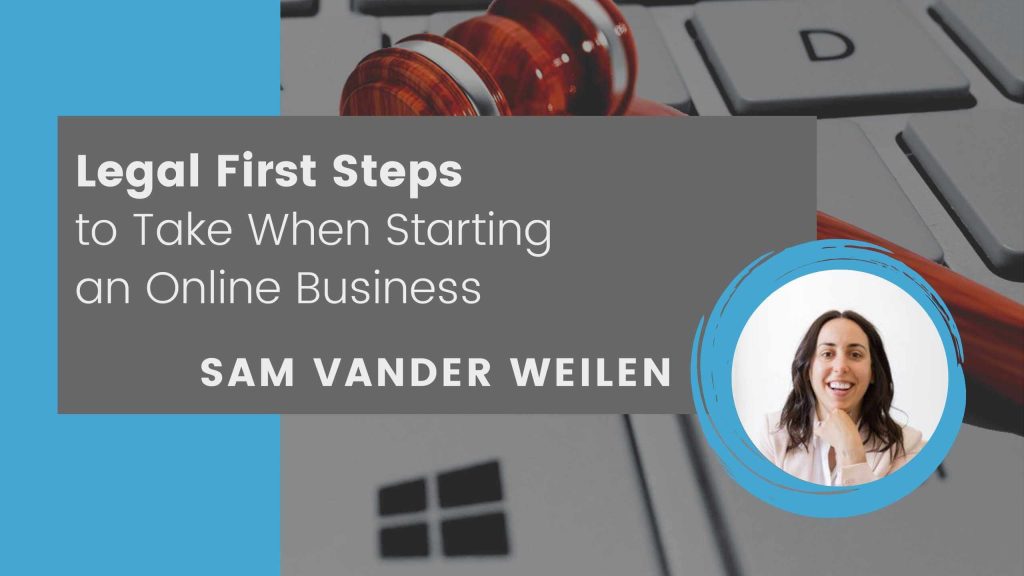Starting an online business can be intimidating—especially if you’re doing it for the first time. How should you structure your business? How will you manage taxes?
In this webinar replay with legal expert Sam Vander Wielen, you’ll learn about online business legal requirements when just getting started. Sam is an attorney-turned-entrepreneur, which gives her a unique and comprehensive understanding of business, from the creative aspect to the legal side.
In this webinar, you’ll learn exactly what you need to know to legally start, protect and grow your membership, including answers to questions like:
- What business structure should I use and why?
- How can I financially protect myself and my business?
- How do I keep my content safe from copycats?
- What kinds of website policies do I need to safeguard my content and transactions?

Webinar Replay: Online Business Legal Requirements
Starting your online business with all the legal pieces in place is one of the best ways to protect yourself and your work. Taking proper legal steps to meet basic requirements helps you:
- Maintain healthy boundaries.
- Get paid.
- Protect your content.
- Avoid the costs and damages of a lawsuit.
Legal problems are no fun, and can cost you a lot of time, effort, money, and potentially even reputation damage. If a lawsuit does happen, you’re more likely to win or get it dismissed if you have set up your business as a legally compliant entity.
Step 1: Form Your Business
Registering your business is the first and most basic step in online business legal requirements. In order to do this, you’ll need to:
Register Your Legal Business Entity
- Register in your state. Check with your county and city, as there may be additional local steps to take.
- Choose your entity type, such as sole proprietor, LLC, corporation, or partnership.
- Sole proprietorship
- Pro: It’s the most basic entity type, and some states don’t even require registration.
- Con: It comes with no personal legal protection.
- Limited Liability Company (LLC)
- Pro: It provides limited personal liability protection.
- Pro: Like sole proprietorship, taxes are simpler than a corporation. However, you can actually file taxes as an S-Corp even if your business is an LLC, if that filing is more beneficial for you.
- Con: It can be more complicated, depending on the state.
- Sole proprietorship
- Choose a Doing Business As (DBA) name. A DBA refers to a trade name or fictitious name that you use to do your business. For example, Target Corporation is an LLC, but their DBA name is Target. Likewise, Stranger Studios is an LLC, but we do business as Paid Memberships Pro.
Note: Any name used as the face of the company should also be submitted when you apply for the LLC.
Set Up Business Banking, Taxes, and Finances
- Set up a business bank account. When you’re just starting out, it’s wise to avoid fees and find a bank that will give you a free business account.
- Connect your business bank account to a payment gateway. This will allow you to start accepting payments for your products or services.
- Get an accountant as soon as you can. While you might be able to get started without an accountant, it’s advisable to get one as soon as you can afford it. The extra assurance is worth it. Note that not all accountants will work with you regularly, so be sure to shop around for an accountant that will communicate with you throughout the year.
- Pay your taxes. Whether it’s quarterly or yearly, set aside 30% of your revenue for taxes.
- Stay on top of renewals. The last thing you want is for your business registration to lapse. Make sure to note when your renewals are taking place, so you don’t forget them. Annual or bi-annual renewal business registration fees are common.
Step 2: Business Insurance
While not an online business legal requirement, business insurance helps you protect your business and your personal finances.
There are many forms of business insurance, but all of them typically pay for a lawyer, judgment, or settlement in the case of a lawsuit. If you’re considering a specific business insurance policy, the primary elements to evaluate include:
- The deductible. This is the most important thing to consider. The higher your deductible, the cheaper your insurance will be. However, keep in mind that you should be able to afford the deductible (if you need to).
- The policy limits. A typical policy limit is $10 million.
- What’s covered in the policy. You don’t want to be surprised if your policy doesn’t cover specific events or circumstances.
Step 3: Contracts
Contracts between you and your customer are essential when it comes to establishing expectations, boundaries, and legal evidence. Getting all of these things in writing will help you maintain control over your business, relationships with your customers, and peace of mind.
Contracts should establish your business policies, such as your:
- Refund policy
- Terms of use
- Privacy policy
- Return policy
For example, these policies act as the proof you need in situations where someone stops paying for your product or service, but continues to access it. A contract is proof that you are owed compensation.
If you run a membership site, it’s ideal to present these contracts at the checkout. You can lay out all of your policies, disclaimers, and any other information, and require agreement to your Terms of Use and other policies before the purchase can be made.
Here are a few more recommendations for your contracts and policies:
- They should be professionally drafted to avoid mistakes or misuse of legal or technical terminology.
- They should be clear, consistent, and easy to explain. This avoids any confusion that could lead to misunderstandings down the road.
- They must be sent and signed correctly. If a contract is not sent and signed correctly, it is not enforceable by law. If you want customers to e-sign, just be sure to use an e-signing compliant program.
Step 4: Intellectual Property Basics
There’s a lot of time, energy, and money that goes into creating content for an online business. It’s only natural that you’d want to protect this intellectual property.
Not sure if a copyright or trademark applies to you? Here are a few examples of types of content that fall under the protections of a copyright:
- Literary works
- Books
- Songs
- Poems
- Videos
- Audio content
Trademarks cover things like:
- The name of a business
- Taglines and sayings
- Logos
Technically, you don’t have to register for a copyright or trademark. Whenever you create something original to you, you automatically retain common law copyright protection.
However, this can be difficult to enforce. So, it’s best practice to register your content if you want to protect it fully. When your content is registered with a copyright or trademark, it means that:
- If someone steals it, you get the presumption of ownership
- You control whether or not others can use it for commercial purposes (such as buying it and using it to create their own business), or if it’s for personal use only.
Frequently Asked Questions
You can batch submit. With copyright registration, you submit by category. For example, submit all your videos and then submit all your handouts. It is not practical to submit everything. A workaround would be to upload your videos to YouTube to take part in YouTube’s Intellectual Property Policy.
Roughly $50 per application, but you may have to submit multiple applications depending on the category of content. Trademark is roughly $225 and it is by class. You would have to register per class. A class allows you to have protection for your specific niche. It does not block everyone from using it in any way.
Yes. You only get protection for the exact way that you submitted it originally.
You can go to a local-to-you intellectual property attorney. Find one that does it for a flat fee, but it can be anywhere from $2,000-$5,000. However, you are capable of submitting it. Sam does teach people how to submit trademarks.
You can register in the new state—or, you can stay registered in the past state and register as a foreign entity in the new state. If you have no plan to return to the old state, you should dissolve and register as a new business in the new state.
Website disclaimers disclaims liability for people visiting your site. People can sue you for things you say or do even if you did not receive payment. Typically it tells people to proceed at your own risk. This protects us from getting blamed when someone is accessing our content.
About Sam Vander Wielen
Sam Vander Wielen is an attorney-turned-entrepreneur and legal educator who helps coaches & service providers legally protect and grow their online brands through her legal templates, her podcast “On Your Terms”, and her signature program, the Ultimate Bundle™.
Sam’s DIY Legal Templates give you instant access to any contract you need. You can fill each template out in 15 mins or less.
Download Sam’s Ultimate Bundle™ and receive 10+ essential contracts and policies, direct support, and 35+ trainings on how to legally run your business.



